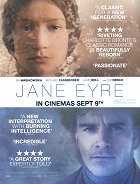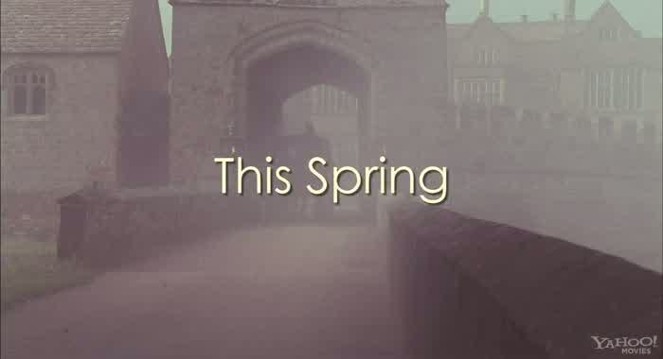Directed by:
Cary Joji FukunagaScreenplay:
Moira BuffiniCinematography:
Adriano GoldmanComposer:
Dario MarianelliCast:
Mia Wasikowska, Michael Fassbender, Judi Dench, Jamie Bell, Su Elliot, Holliday Grainger, Tamzin Merchant, Amelia Clarkson, Craig Roberts, Sally Hawkins (more)VOD (4)
Plots(1)
In the 19th Century-set story, Jane Eyre (Mia Wasikowska) suddenly flees Thornfield Hall, the vast and isolated estate where she works as a governess for Adèle Varens, a child under the custody of Thornfield’s brooding master, Edward Rochester (Michael Fassbender). The imposing residence - and Rochester’s own imposing nature - have sorely tested her resilience. With nowhere else to go, she is extended a helping hand by clergyman St. John Rivers (Jamie Bell) and his family. As she recuperates in the Rivers’ Moor House and looks back upon the tumultuous events that led to her escape, Jane wonders if the past is ever truly past. (Universal Pictures UK)
(more)Videos (2)
Reviews (11)
"Jane Eyre" is not exactly a movie that I would like to watch alone, but I was interested in it, so I took the opportunity and watched it with my girlfriend. I must say that I was very curious about how the collaboration between Mia Wasikowska and the favorite Michael Fassbender would work. I have to say that I was very surprised by how well they worked together. Michael Fassbender once again showed that it doesn't matter how many movies he makes in a year, he is always perfect and different and unique every time. I could praise him constantly, but I also have to highlight Mia. As an Australian, she fit beautifully into the British environment, but above all, she gave an excellent performance, for which I will forgive her for "Alice in Wonderland". I am not familiar with the original work, and this was also my first cinematic encounter with Jane, but I think that some moments here were still weaker. Especially the moments when they finally admit their love for each other. From British conservatism and coldness, it suddenly switched to American smiles and maximum display of emotions. I know that this is what the audience wants, but wouldn't it be better if the slight aloofness remained? The ending could then be even stronger, proving that Charlotte Bronte's books were not just ordinary library books and they still have their power in today's world. More: http://www.filmovy-denik.cz/2012/07/runaways-rok-jedna-nedotknutelni-johnny.html
()
As a viewer and reader who has always somehow avoided Jane Eyre, I couldn't have chosen a better version for our first meeting. However, this satisfied realization was born quite heavily. After half an hour of the main heroine's suffering almost in the style of Oliver Twist, I was shaking my head at the dysfunctionality of the events on the screen and the contradictory atmosphere that wouldn't let me properly engage in the story. But as soon as Michael Fassbender enters, the 19th century image takes on completely different colors. Whether it's the colorful reflections of twisted romance and captivating small dialogues or the darker shades in suggestive scenes of the castle's mystery. And when I reached the point and the perfectly fitting ending, I felt relieved. The heart's melody plays loudly enough, Fassbender slowly conquers the wide Hollywood scene, and there is a new (and very resonating) piece of complex historical romance in the world.
()
An exquisite Victorian romance, perfectly in tune with the current formal and aesthetic trends of modern filmmaking. Raw cinematography, zero pathos and spare dialogue passages, where everything is focused on editing, the actors' facial expressions and overwhelmingly unspoken emotions. Very modern yet period-accurate and full of the traditional values we love so much in these tales of fate from yesteryear. You'd almost want to say that these cinematic affairs were left in the dust somewhere in the late nineties, but thankfully that's not true, they're still around today, they're just far fewer and of a good quality.
()
- I dream. - Awaken then. Jane Eyre is a mature synthesis of two “women’s genres”: melodrama and gothic horror. The narrative complies with the intentions of feminist discourse, taking into account the numerous restrictions that 19th-century women had to overcome, while not hyperbolising them to such an extent that the film would become another hopeless story of female suffering. The protagonist is self-confident and conscious of her abilities, and her calm dialogues with her “master” do not correspond to the traditionally depicted relationship between superiority and subordination. Cautiously being in love without fully giving herself over to her partner blunts the sentimental edges of the melodramatic level and makes it impossible to watch Jane Eyre as a straightforward tear-jerker. Fukunaga’s adaptation uses the classic novel to pose topical questions without doggedly striving for modernity in any other aspects of the film – cinematography, production design, the characters’ vocabulary. In other words, the film’s creators interpret the original novel as people instructed by developments in thinking about the social position of women, and as such logically project into it what Brontë could only consider to be a utopia in her time. Thanks to that, the film achieves an extraordinary balance between the modern and the classic. 85%
()
Extreme romanticism via an atmosphere à la Gothic horror. Simply gestures instead of speeches. Courting by the fireplace through verbal exchanges that make Nadal versus Federer a boring watch. It’s hopes of being movie theatre experience of the year are dashed by the emotionally chilly ending where gestures gave way to speeches and other maladies very familiar in most adaptations of the classics of Romanticism.
()



Ads